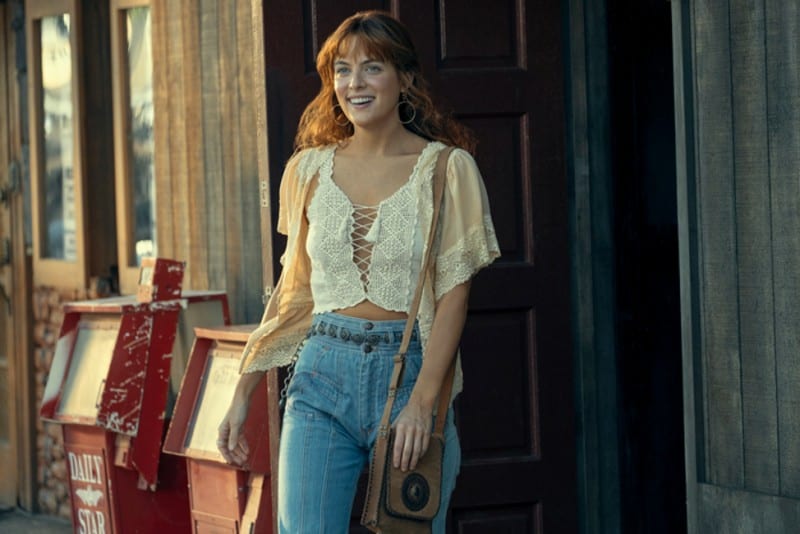Riley Keough headlines the new faux-roc doc, which provides good performances and catchy audio, but is also riddled with cliches and self-crucial framing.

Lacey Terrell/Key Video
For a brief time in the ‘70s, Daisy Jones and the Six was the most significant (fictional) band in the world. Viewers tuning into the new Prime Online video display of the identical name will know as a lot early on, for the reason that the band users inform us, yet again and all over again in the show’s rock doc framing gadget, that they were being on leading of the entire world. It is a verbalization that the show confuses for legitimacy, as the adaptation of Taylor Jenkins Reid’s 2019 novel turns out to be a try-hard drama that never ever reaches the amount of greatness it aspires to.
Like the novel, the sequence follows the customers of a Fleetwood Mac-like band that came with each other on an almost cosmic collision class in the ‘70s. A group of guys headed up by supposedly charismatic perfectionist Billy Dunne (Sam Claflin) scrape collectively a meager-but-awesome musical existence as The Dunne Brothers, prior to their lives are transformed when their record label shoves them collectively with a different big individuality: Daisy (Riley Keough). A social gathering-really hard groupie turned singer-songwriter in the e-book, the new series provides Daisy as a woman who’s not like other girls: her peers appear to shows to hook up or get high, a person details out to her, but she’s there for the music.
Daisy is a dazzling spot in a series that mostly doesn’t get the job done: Keough imbues her general performance with shades of unhappiness, pleasure, self-destruction, and self-possession. When the sequence is not following a disjointed Powering The Audio-style structure and going for walks a trope-hefty route towards its underwhelming summary, it is diving fairly deep into a handful of intriguing subject areas. A single of them is Daisy’s placement as a beautiful, gifted white girl in the new music sector: the series deftly demonstrates how generally guys in her lifestyle try to shove her into a box labeled “muse” or “pretty face” or “girlfriend.” All the things Daisy does is in bristling response to her lifelong underestimation, and it’s a dynamic that remains attention-grabbing through the show’s ten-episode operate.
Not a great deal else in the present is as attention-grabbing as it usually means to be, nevertheless. Particularly in its earliest episodes, Daisy Jones and the 6 is excruciatingly formulaic. Prospective future in-laws scold Billy about the evening meal table for not obtaining a far more regular job route. Daisy’s mom, a cartoonishly absent determine of neglect, catches her singing and insists that no one needs to hear her voice. The Dunne Brothers move to LA’s Laurel Canyon with practically nothing but a van, a couple of guitars, and a aspiration. In a submit Stroll Tough and Odd: The Al Yankovic Tale entire world, it’s difficult to acquire in some of these paint-by-numbers scenes (which are substantially less cliched in the supply substance) with a straight face.
Daisy Jones does significantly superior when it leans into the audio at its core. The present does not hedge its bets when it arrives to turning Reid’s tracks into the true deal, and it reimagines additional than a single of the novel’s key hits. Whilst the audio in Daisy Jones doesn’t often seem particularly rock and roll, it is emotive and particularly catchy, built in actual lifetime by an amazing slate of collaborators that incorporates Phoebe Bridgers and Marcus Mumford, in accordance to Billboard. “Look At Us Now,” the anthem that is been closely featured in the show’s ad campaign, is a catchy, soaring anthem, whilst a track that is meant to express the angst of the central duo’s artistic relationship, “Regret Me,” has genuine ‘70s vibes. Claflin and Keough surface to lend authentic vocals to the tracks that also make them feel sincere.
Sadly, the clearly show cannot very rise to the obstacle of sincerity laid out by its source material, which is at its core about the unglamorous but vital adult conclusions that occur with marriage, resourceful partnership, and sobriety. A entire great deal of Daisy Jones and the 6 feels marginally also bogus, from the wigs that band members don for interviews set years right after the band’s collapse, to the supposedly crackling and undeniable pressure that we’re meant to see constructing involving Billy and Daisy. The supporting band cast features Suki Waterhouse, Will Harrison, Sebastian Chacon, and Josh Whitehouse. Whilst all of them do well in the ‘70s-set scene, the choppy edit of the retrospective framing device would make the group seem largely stiff and awkward.
Other supporting solid mates, even though, get more time to glow than they did on the web site. Tom Wright plays music field veteran Teddy Rate as a weary-but-sensible mentor, whilst the always-welcome Timothy Olyphant pops up as a tour supervisor. The display rewrites the tale of Daisy’s most effective mate Simone, a disco star played warmly by Nabiyah Be, for the far better. And Camila Morrone skillfully pulls off the series’ biggest challenge, enjoying a character who (on equally the web page and the display) narrowly side-measures the nagging-spouse-at-residence trope to turn out to be the surprise coronary heart of the tale.
Enthusiasts of classic rock and stories about fame and resourceful collaboration could get swept up by Daisy Jones and the 6 if they want to, but I just can’t depend myself amid them. It’s an adaptation that all but begs for us to see its fictional band’s story as sport-shifting and oh-so-particular, but the stop consequence is a collection that’s so focused on enjoying its self-crucial tune that it normally misses the conquer fully.
Linked Matters: Amazon Prime

Proposed Examining
